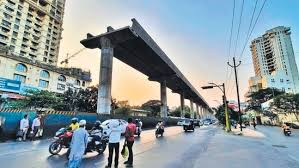After SC nudge, MMRDA scraps tender process for Thane-Bhayandar mega infra projects worth Rs 14,000 crore

In a major development, the Mumbai Metropolitan Region Development Authority (MMRDA) has canceled tenders for two mega projects worth ₹14,000 crore. The decision came after the Supreme Court nudged the agency to review its process. Infrastructure firm Larsen & Toubro (L&T) had raised serious concerns about the fairness of the bidding.
Overview of the Projects
The now-canceled tenders covered two key road projects aimed at easing travel between Thane and Bhayandar:
- Thane-Ghodbunder to Bhayandar Tunnel Project
- Estimated cost: ₹8,000 crore
- Plan: A 5-kilometer twin tunnel connecting Gaimukh and the Fountain Hotel Junction. This tunnel was meant to reduce traffic congestion and travel time.
- Elevated Road from Thane to Bhayandar
- Estimated cost: ₹6,000 crore
- Plan: A 9.8-kilometer elevated road running along Vasai Creek. The goal was to improve vehicle movement and reduce pressure on existing roads.
These projects formed part of the larger Mumbai Coastal Road extension. Authorities planned to improve regional connectivity and boost infrastructure in the rapidly growing Mumbai Metropolitan Region.
Legal Dispute Reaches Supreme Court
L&T challenged MMRDA’s decision to disqualify it from the bidding process. The company argued that the agency did not follow fair procedures. It also said MMRDA failed to communicate why its bid was rejected before opening financial bids.
The Supreme Court found these claims serious. The bench, led by Chief Justice B.R. Gavai, questioned how a top infrastructure player like L&T could be disqualified without clear reasons. The judges highlighted the need for transparency and fairness in government contracts. They stressed that public projects should follow procedures that uphold trust and public interest.
MMRDA Responds to Supreme Court Concerns
During the court proceedings, MMRDA decided to scrap both tenders. Senior Advocate Mukul Rohatgi, representing the agency, confirmed this decision. “We have decided to cancel the two tenders. The government will now decide how to move forward,” he told the court.
The court then marked the petition as resolved. Since the tenders were withdrawn, the legal matter no longer needed a ruling. The bench did not comment on the merit of L&T’s claims but welcomed the move toward transparency.
How This Affects the Public and Private Sector
For Citizens:
People in Thane, Bhayandar, and nearby areas may face delays in infrastructure upgrades. However, a transparent re-tendering process could lead to better results in the long term.
For Construction Firms:
This case sets a clear message. Authorities must treat all bidders fairly and follow proper procedures. Companies now know that the courts can intervene if processes seem unfair.
For the Government:
The state will now need to relaunch the bidding process. Although this may take time, it gives the administration a chance to correct earlier mistakes. This could rebuild public trust and encourage wider participation.
The Supreme Court’s Broader Message
The court didn’t just resolve a legal issue. It reinforced the value of fair competition in public infrastructure projects. By raising questions about the process, the judges highlighted that good governance includes fairness in spending public funds.
Public tenders often attract scrutiny. They involve large sums and shape cities for decades. Any flaw in the process can create mistrust, inflate costs, or affect project quality. The court’s message was clear: government agencies must ensure clean and transparent bidding, especially for high-value contracts.
What’s Next?
MMRDA has not yet announced when it will release new tenders. Internal reviews are reportedly underway. The Maharashtra government may also issue new guidelines to strengthen bidding practices.
L&T, along with other players, could get another chance to participate. This time, the process will likely include clearer rules and better communication. Authorities may also introduce third-party audits or digital systems to make tenders more transparent.
Conclusion
MMRDA’s decision to cancel tenders worth ₹14,000 crore sends a strong signal. It shows that even powerful agencies must respect fair processes. While the delays may inconvenience citizens in the short term, the outcome could lead to better infrastructure in the long run.
The Supreme Court’s role was crucial. It didn’t issue a verdict but prompted a course correction. That action protects public interest and supports fairness in how the country builds its future.






